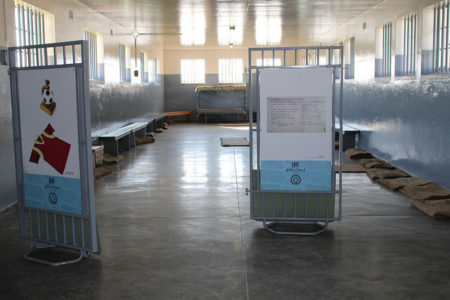 Sunday, July 8 – We visited one of the major historical sites of the Apartheid era today, Robben Island. The history of Robben Island is something that continued to interest me from the 30-minute boat ride to the prison tour itself. The boat ride gave some context before the tour about the use of Robben Island by both the Dutch and the British. One interesting thing about Robben Island is that one of the only successful Robben Island prison escapes was done by Autshumao of the KhoiKhoi tribe, one of the first prisoners of Robben Island under Dutch occupation, using a stolen towing boat.
Sunday, July 8 – We visited one of the major historical sites of the Apartheid era today, Robben Island. The history of Robben Island is something that continued to interest me from the 30-minute boat ride to the prison tour itself. The boat ride gave some context before the tour about the use of Robben Island by both the Dutch and the British. One interesting thing about Robben Island is that one of the only successful Robben Island prison escapes was done by Autshumao of the KhoiKhoi tribe, one of the first prisoners of Robben Island under Dutch occupation, using a stolen towing boat.
We were able to see Nelson Mandela’s cell, the meal plan for black and colored men held in the prison, and the identification cards that were issued to all prisoners. The impact of the tour of Robben Island was one of immense proportions. The idea of such harsh and cruel treatment of black and colored bodies in the Apartheid era is a problem that still plagues America today. Prisoners were tortured and forced into unfair sentences and remained unlawfully imprisoned.
 The story of Robert Sobukwe, founder of the Pan African Congress, is one of the most interesting ones. After uniting a large number black and colored South Africans to burn their dompasses in protest against the Apartheid government, the government saw him as a threat and created the Sobukwe clause to keep him “lawfully” imprisoned on Robben Island and isolate him from the rest of society. The potential that Robert Sobukwe had to be a more impactful leader peaks my curiosity, as he was the leader that famously raised the belief “Africa for Africans.” That sign resonated with me because of the debate about “America first.” Is it selfish for us as humans to put ourselves first? Are we dehumanizing each other by worrying about those who we share more commonalities with? It’s weird because we always say how foreign aid can be seen as intrusive. I just wonder if Robert Sobukwe would have been like Trump, or if patriotism – if we can call it that – could work for countries struggling with issues surrounding separate identities.
The story of Robert Sobukwe, founder of the Pan African Congress, is one of the most interesting ones. After uniting a large number black and colored South Africans to burn their dompasses in protest against the Apartheid government, the government saw him as a threat and created the Sobukwe clause to keep him “lawfully” imprisoned on Robben Island and isolate him from the rest of society. The potential that Robert Sobukwe had to be a more impactful leader peaks my curiosity, as he was the leader that famously raised the belief “Africa for Africans.” That sign resonated with me because of the debate about “America first.” Is it selfish for us as humans to put ourselves first? Are we dehumanizing each other by worrying about those who we share more commonalities with? It’s weird because we always say how foreign aid can be seen as intrusive. I just wonder if Robert Sobukwe would have been like Trump, or if patriotism – if we can call it that – could work for countries struggling with issues surrounding separate identities.
The tour taught me something that most people don’t think about when it comes to human-centered design. Everyone is an individual, but we choose to stop considering some people human. We should stop thinking that we can deprive people of their humanity, and instead we should focus on the struggles that make them human. Human-centered design is not only about helping people who we feel are the most underserved. It is about impacting all those who have been underserved by society.
Chetachukwu O., Benjamin Banneker Academic High School
